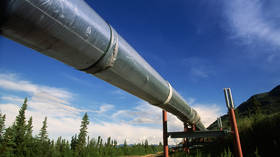Germany sticks to pledge on Russian pipeline-oil imports

Germany stopped imports of Russian oil via pipelines on January 1, despite the fact that the latest EU embargo exempts piped deliveries of crude to the bloc from the sanctions-hit nation.
The EU embargo on imports of Russian sea-borne oil came into effect on December 5, but flows of pipeline oil to landlocked EU member states are excluded from the ban. Germany and Poland had previously pledged to avoid making use of the exception and stop imports of Russian crude via the Druzhba pipeline from the start of 2023.
The cessation of pipeline supplies is expected to affect major German refineries in Schwedt, in the state of Brandenburg and Leuna, and in the state of Saxony-Anhalt, which supply eastern Germany with fuel, German press agency DPA reports.
According to the media, the German federal government has said it has identified alternative sources of supplies to the refineries, which have been processing Russian crude oil from the Druzhba pipeline for decades.
Schwedt is the country’s fourth-largest refinery and supplies 90% of the fuel in Berlin. Russian oil giant Rosneft held a 54.17% stake in the enterprise until September, when Germany placed the company’s local undertakings in trusteeship, handing control of the refinery to the country’s energy market regulator.
In December, Germany and Poland reached an agreement under which Warsaw committed to provide enough supply for the Schwedt refinery to run at 70% capacity from January.
However, Russia’s pipeline operator Transneft received orders for crude oil purchases from both Germany and Poland, despite the two countries pledging not to buy Russian oil transported via Druzhba, according to CEO Nikolay Tokarev, as quoted by RIA Novosti.
Last week, Russian Deputy Prime Minister Alexander Novak said the EU would find it difficult to replace Russian supplies of crude and oil products once the embargoes come into full effect.
For more stories on economy & finance visit RT's business section













